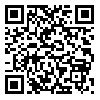Volume 30, Issue 9 (December 2019)
Studies in Medical Sciences 2019, 30(9): 744-752 |
Back to browse issues page
Download citation:
BibTeX | RIS | EndNote | Medlars | ProCite | Reference Manager | RefWorks
Send citation to:



BibTeX | RIS | EndNote | Medlars | ProCite | Reference Manager | RefWorks
Send citation to:
Heidari R, Alipour S, Meghdari A, Shehni Yailagh M. THE IMPACT OF SOCIAL ROBOTS INTERVENTION ON IMPROVING THE EXECUTIVE FUNCTIONS IN CHILDREN WITH AUTISM DISORDER. Studies in Medical Sciences 2019; 30 (9) :744-752
URL: http://umj.umsu.ac.ir/article-1-4906-en.html
URL: http://umj.umsu.ac.ir/article-1-4906-en.html
Associate Professor, Department of Psychology, Shahid Chamran University of Ahvaz, Ahwaz, Iran. (Corresponding Author) , dralipour.sirous@gmail.com
Abstract: (5539 Views)
Background & Aims: Autism is a pervasive developmental disorder that involves persistent challenges in social interactions, speech, nonverbal communication, and restricted and repetitive behaviors. In this research, we studied the effect of social robots intervention on the executive functions of children with autism disorder.
Materials & Methods: This study is an experimental research method with pre- and post-test allocated to an experimental and a control group. The sample of this study consisted of twenty autistic children who were referred to the Centre of Occupational Therapy and Rehabilitation of Autism Disorder in Tehran. These samples were selected from the children within the age 6 and 9 years by a sampling procedure. They were randomly assigned into two experimental and control groups (10 subjects in each group). We used Nao social robots for robotic intervention. We utilized executive functions and continuous performance tests to evaluate the improvements of these children in twelve intervention sessions. To analyze the data Multivariate covariance was used.
Results: The results demonstrated that social robots have a positive influence on the executive function (attention and inhibition response) of children with autism disorder (p<0/001, η= 0/93).
Conclusion: These findings emphasize the role of new technologies, especially robots, in empowering and improving the executive function of autistic children.
Materials & Methods: This study is an experimental research method with pre- and post-test allocated to an experimental and a control group. The sample of this study consisted of twenty autistic children who were referred to the Centre of Occupational Therapy and Rehabilitation of Autism Disorder in Tehran. These samples were selected from the children within the age 6 and 9 years by a sampling procedure. They were randomly assigned into two experimental and control groups (10 subjects in each group). We used Nao social robots for robotic intervention. We utilized executive functions and continuous performance tests to evaluate the improvements of these children in twelve intervention sessions. To analyze the data Multivariate covariance was used.
Results: The results demonstrated that social robots have a positive influence on the executive function (attention and inhibition response) of children with autism disorder (p<0/001, η= 0/93).
Conclusion: These findings emphasize the role of new technologies, especially robots, in empowering and improving the executive function of autistic children.
Send email to the article author
| Rights and permissions | |
 |
This work is licensed under a Creative Commons Attribution-NonCommercial 4.0 International License. |






